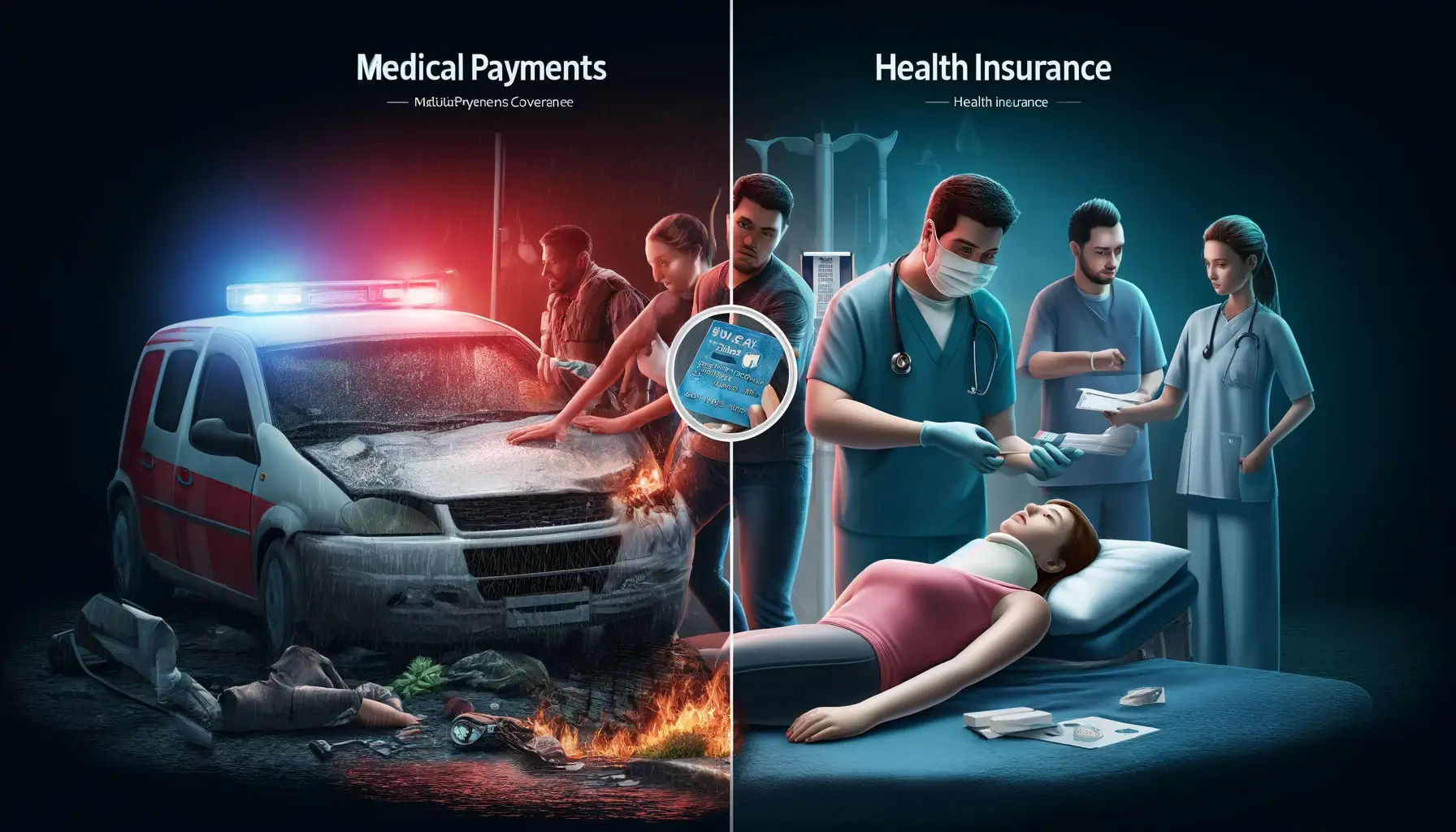What does Medical Payments Coverage cover?
Insurance that Pays for your Initial Medical Expenses
// AUSTIN AUTO PROTECTION
Medical Payments Coverage
Medical Payments coverage is a type of insurance that pays for your initial medical expenses if you’re hurt in an accident, regardless of fault. This means that even if you’re found to be at fault for the accident, your Medical Payments Coverage will still provide financial assistance for your medical bills.
Understanding Medical Payments Coverage
After an accident, the last thing you want to think about is how you’re going to pay your medical bills.
At Risk Coverage, we can help you get the coverage added to your policy so you can have peace of mind. Medical Payments Coverage can help pay medical expenses due to injuries from an accident to you or your passengers. This coverage is available regardless of fault.

What is Medical Payments Coverage?
Medical Payments Coverage, also known as Medpay, helps pay for your initial medical expenses related to an accident, regardless of fault. ‘Initial medical expenses’ refer to the immediate medical costs you may incur after an accident, such as emergency room visits, hospital stays, or surgeries.
Medical Payments Coverage can help cover expenses related to:
- Doctor, hospital, and emergency room visits
- Initial hospital stay
- Surgeries and X-rays
- Health insurance deductibles and co-pays
- Prostheses or other medical mobility devices
- Ambulance transport
- Ongoing medical services
Medical Payments Coverage does not cover:
- Costs that go beyond your auto policy’s stated limit
- Childcare expenses while recovering
- Wage reimbursement if you’re unable to work due to your injuries
- Medical costs for injuries to other drivers involved in an accident
- Any medical treatments that aren’t related to the auto accident
If you have questions, we’re here to help you get the answers to your Medical Payments Coverage questions. It can also be a good idea to review your health insurance policy. In the event of an accident, filing a claim under Medical Payments Coverage is a straightforward process. You simply need to provide the necessary documentation, such as medical bills and proof of the accident, and we’ll take care of the rest.

Is Medical Payments Coverage the same as health insurance?
No. Medical Payments Coverage is not the same as health insurance. It only provides coverage in the event of an automobile accident.
If you’re in an accident and have Medical Payments Coverage and health insurance, your Medical Payments Coverage will pay for covered expenses related to the accident first. Once you reach the limit of your Medical Payments Coverage, then your health insurance covers the remaining costs.
Ready for a quote?
How much Medical Payments Coverage do I need?
When you buy Medical Payments Coverage, you’ll typically have a choice of limits. While you should base your decision on your situation, a few things to think about are
- Medical expenses over your policy limits will be your responsibility
- If you have a high-deductible health insurance plan
- What is your specific financial situation is


What is the difference between Medical Payments Coverage and Personal Injury Protection (PIP)?
Personal Injury Protection, or PIP, is like Medical Payments Coverage but more comprehensive. It’s called ‘no-fault coverage’ because it pays out claims regardless of who is at fault in the accident. Simply put, PIP covers more than just medical bills after an accident.
In general, if you’re injured due to a covered loss, PIP can help cover related
- Medical bills
- Expenses associated with physical and occupational therapy
- Rehabilitation costs and other professional health services
- Lost wages
- Other qualifying non-medical or work-related losses
- Death benefits
PIP can also help pay for your injuries if you’re
- A passenger in another person’s car
- Struck by a vehicle as a pedestrian or while bicycling
Is Medical Payments Coverage mandatory?
In some states, Medicaid coverage is mandatory, while in other states, it may be optional or not offered at all.

Should I get Medical Payments Coverage?
Here are some things to think about when deciding if you need Medpay.
- You have a high-deductible medical insurance plan. Here, Medical Payments Coverage can help cover insurance deductibles.
- You like to have financial peace of mind in the event of an accident.
// faq
Common questions about car insurance
What is car insurance?
First, let me start with the basics—an individual must purchase liability insurance for their vehicle (and thus its owner) to be considered “insured” under state law. This rule applies across all circumstances- even if no accidents take place!
This protection exists so others may not suffer financially due to injuries sustained during a collision. We also offer Collision insurance if your vehicle needs repairs after an accident and comprehensive coverage if your car is vandalized.
How can I save money on car insurance?
The first way to save on car insurance quotes is by ensuring that your vehicle meets the minimum safety standards.
This will also help avoid costly repairs in case of an accident, leading you into a higher premium rate category due to being risky drivers!
You should consider reviewing any existing coverage aspects as well if they’re not up-to-par with current market rates – this includes both physical damage protection beyond merely bumper-, windshield-, comprehensive and collision-.
How do I file a car insurance claim with Risk Coverage?
Like many of our policyholders, the company that provides you with car insurance can be a life-saver, and we’re here to help. Log onto Risk Coverage’s website or call us if your car needs immediate attention, so we’ll ensure it gets the best care possible!
Should I get an umbrella policy too?
If you’re involved in an auto collision, and the other person’s fault is unclear, it may be time to consider getting extra protection.
Umbrella policies offer increased financial compensation for injuries, damage done on behalf of a covered individual that results from accidents occurring outside their control (such as driving into traffic), plus legal fees that will arise.
What are auto insurance coverages available?
Insurance for auto policies varies by state, but the basics of an auto policy include multiple coverages.
Some common types are liability (to protect against physical injury), comprehensive (for damage), and collision(to assist with reporting accidents).
You might also need medical payments or personal effects coverage if you rent cars regularly due to various restrictions in some states – these will depend entirely upon your specific situation!
Does car insurance cover rental cars?
Your car insurance may provide coverage for rental cars. To find out, call Risk Coverage to see if your current auto insurance policy covers rental vehicles.
Risk coverage will never let you walk away without vehicle rental. If you have full range, why? Because in certain situations, for $2 a month, you can be covered if you get in an accident and need a vehicle to continue getting around.
There are some benefits of having Credit cards since some provide discounts for renting a car. Some credit cards offer additional coverage but make sure you understand the terms and conditions, including any limitations on the type and amount of coverage.
What do I need to get an auto insurance quote?
To get the most accurate quote on new policies, you need to supply your car’s make, model, year, and information about your driving history. You’ll need your vehicle identification number (VIN) handy to purchase an auto policy. We’ll also ask for your driver’s license number.
Not sure which coverages to select? Our car insurance calculator can help you estimate your coverage needs. Ready to get started? Get a quick car insurance quote online or call us.
